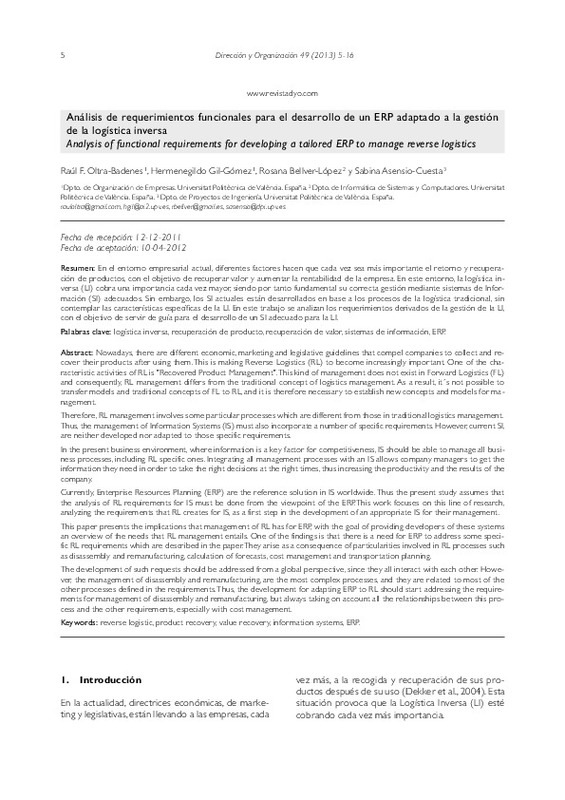|
Resumen:
|
[EN] Nowadays, there are different economic, marketing and legislative guidelines that compel companies to collect and recover
their products after using them. This is making Reverse Logistics (RL) to become increasingly ...[+]
[EN] Nowadays, there are different economic, marketing and legislative guidelines that compel companies to collect and recover
their products after using them. This is making Reverse Logistics (RL) to become increasingly important. One of the characteristic
activities of RL is "Recovered Product Management". This kind of management does not exist in Forward Logistics (FL)
and consequently, RL management differs from the traditional concept of logistics management. As a result, it´s not possible to
transfer models and traditional concepts of FL to RL, and it is therefore necessary to establish new concepts and models for management.
Therefore, RL management involves some particular processes which are different from those in traditional logistics management.
Thus, the management of Information Systems (IS) must also incorporate a number of specific requirements. However, current SI,
are neither developed nor adapted to those specific requirements.
In the present business environment, where information is a key factor for competitiveness, IS should be able to manage all business
processes, including RL specific ones. Integrating all management processes with an IS allows company managers to get the
information they need in order to take the right decisions at the right times, thus increasing the productivity and the results of the
company.
Currently, Enterprise Resources Planning (ERP) are the reference solution in IS worldwide. Thus the present study assumes that
the analysis of RL requirements for IS must be done from the viewpoint of the ERP.This work focuses on this line of research,
analyzing the requirements that RL creates for IS, as a first step in the development of an appropriate IS for their management.
This paper presents the implications that management of RL has for ERP, with the goal of providing developers of these systems
an overview of the needs that RL management entails. One of the findings is that there is a need for ERP to address some specific
RL requirements which are described in the paper. They arise as a consequence of particularities involved in RL processes such
as disassembly and remanufacturing, calculation of forecasts, cost management and transportation planning.
The development of such requests should be addressed from a global perspective, since they all interact with each other. However,
the management of disassembly and remanufacturing, are the most complex processes, and they are related to most of the
other processes defined in the requirements. Thus, the development for adapting ERP to RL should start addressing the requirements
for management of disassembly and remanufacturing, but always taking on account all the relationships between this process
and the other requirements, especially with cost management.
[-]
[ES] En el entorno empresarial actual, diferentes factores hacen que cada vez sea más importante el retorno y recuperación
de productos, con el objetivo de recuperar valor y aumentar la rentabilidad de la empresa. En este ...[+]
[ES] En el entorno empresarial actual, diferentes factores hacen que cada vez sea más importante el retorno y recuperación
de productos, con el objetivo de recuperar valor y aumentar la rentabilidad de la empresa. En este entorno, la logística inversa
(LI) cobra una importancia cada vez mayor, siendo por tanto fundamental su correcta gestión mediante sistemas de Información
(SI) adecuados. Sin embargo, los SI actuales están desarrollados en base a los procesos de la logística tradicional, sin
contemplar las características específicas de la LI. En este trabajo se analizan los requerimientos derivados de la gestión de la LI,
con el objetivo de servir de guía para el desarrollo de un SI adecuado para la LI.
[-]
|







